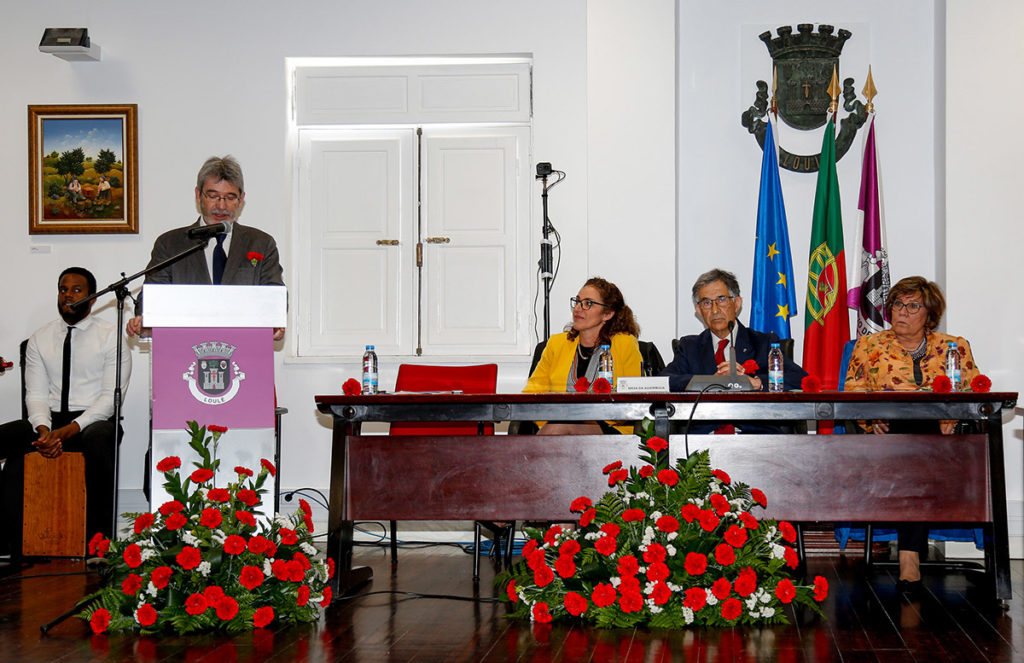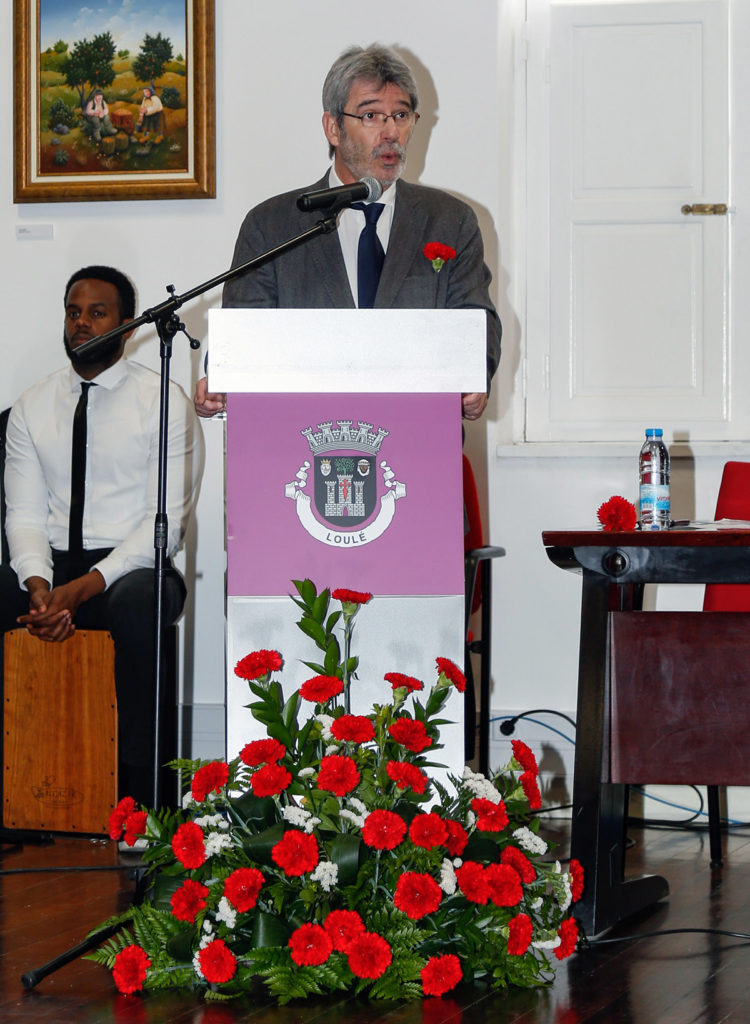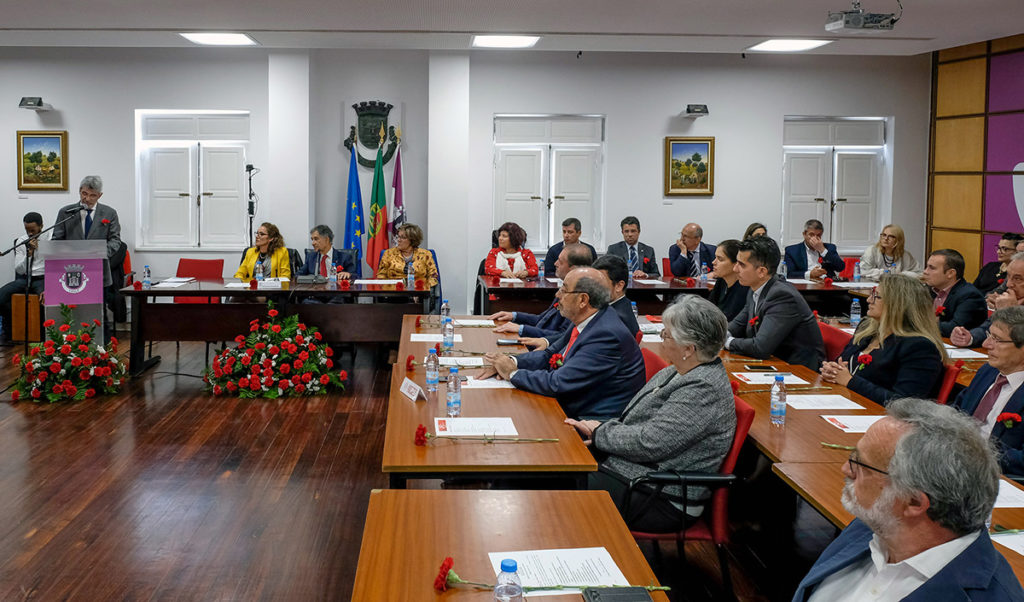O Sul Informação publishes, exclusively, the intervention of António Branco, university professor and former rector of the University of Algarve, in the solemn commemorative session of the 25th of April, in the Municipal Assembly of Loulé. A text that deserves careful reading and invites reflection:
I thank all the party groups of the Municipal Assembly for the invitation, which so honored me, to intervene in this solemn session celebrating the 25th of April.
This is a very important date for all of us, as it was the day on which we once again aspired to live in a country based on the values of Freedom, Equality and Fraternity.
Zeca Afonso's song “Grândola, Vila Morena” speaks of this, at a good time chosen by the Armed Forces Movement as a sign for the definitive start of the military operations that would lead to the liberation of a country subjugated by the Salazar dictatorship.
Inspired by her, I ask right away, challenged by those words that are so demanding, so strong and so beautiful: are we freer today, are we more equal today, do we live today in a more fraternal country?
And I answer without hesitation: compared to the situation that existed until April 24, 1974, yes, we are freer and more equal and the country is more fraternal – but not as much as we allow ourselves to dream.
I don't even know if the collective that we are continues to walk determinedly towards the Utopia designed by this tripod of Democracy that I decided to convene at the opening of this intervention.
However, apparently this was not the subject proposed to me for this session. Prof. Adriano Pimpão, on behalf of the Municipal Assembly, to develop the following theme: «The word as a weapon of democracy». Therefore, I will try to embody the task I was given and which I accepted with enthusiasm and a sense of responsibility.
When Prof. Pimpão mentioned the theme, the title of a song by José Mário Branco and a statement by Wittgenstein echoed in me. As for the song, I believe that everyone present knows what I'm talking about: it is “The song is a weapon”. The phrase of the philosopher of language goes something like this: "The limits of my language are the limits of my world".
Two good reasons for this intervention seemed to me, even if it implies, as it will imply, taking ownership of both to develop the ideas that I would like to present to you. I'll start with the second.
Wittgenstein's phrase, which I have used for many years in class, interests me not so much because of the specific meaning that the author attributes to it in his philosophical theses, but because, removed from this context, it autonomously expresses the very strong idea of the existence of an intrinsic relationship. between the language we have and the extent of our world.
Let's imagine, for example, that it would be possible for me to draw a circle involving all the words I use in the various contexts of my life: according to that phrase, the frontier of the world I know and about which I am able to express myself would thus be drawn.
From this image it follows that the smaller this set of linguistic resources, the smaller the available world and that, therefore, the more we are able to expand our useful vocabulary, the richer the open world in front of us will be.
Being intrinsic, this relationship can be seen in the opposite perspective: the more closed and small the world I move in, the smaller the set of words I need to live in it – and it will also be true that the more my world becomes broaden, the more enriched my ability to express myself through words.
This very simple scheme opens up infinite exploratory possibilities, all around the relationship established between individual language and the world.
And from it comes a principle that I cherish: the acquisition process of language, throughout life, determines the degree of quality of the world in which I move, being not only the world I am able to recognize and name but also the world about which I am able to express myself and with which I am able to interact more or less freely.
For many philosophers, in fact, there is no world beyond the one we designate through words - which is why we always have to find a new word for a new reality, be it an object, a habit, an insect, a bacteria, a disease - and so on.
This is one of the main characteristics of literate societies, that is, societies based on writing and reading: everything, but even everything, from the simplest emotion to the most complex idea, from the smallest object to the most intricate organization, everything is based on our ability to name, to communicate, to express through words.
We have such a need for them that we even invented one to describe what is difficult to translate into words: the word “ineffable”.
Let's go back to the opening sentence: "The limits of my language are the limits of my world." In addition to the aforementioned aspects, it contains another idea related to the mythical origin of language, the idea that, even when used profanely in an overwhelming daily life, they maintain a kind of matrix power, a kind of magical force ready to be activated whenever someone – or a collective acting in unison – summons this power.
Great poets do it, some politicians too. Poets do this to reveal to us the intimate sacredness of words, hidden under the formless uses we make of them in our daily lives, and thus to bring to light the sacredness of the very world they name with them. This particular use of language, poetry, is perhaps the one that best exerts the extraordinary human capacity to stretch the limits of the world through language.
That is why poetry is in itself a heritage, because it is always a vestige of the ancient human faculty of naming and, through naming, creating what did not entirely exist before. That's why poetry is knowledge and proposes to us, in each verse, a refoundation of the world in which we live.
Let's hear it, on one of its infinite faces:
The old vulture is wise and smoothes its feathers
Rot pleases him and his speeches
Have the gift of making souls smaller
Sophia de Mello Breyner Andresen published this poem in 1962 (Book Six). His contemporaries immediately recognized in the sinister figure of the “old vulture” the dictator António de Oliveira Salazar.
We might, then, be tempted to conclude that, with the dictatorship overthrown on April 25, 1974, this short poem lost its relevance, serving only as a poetic document of a particularly painful moment in our history.
The great poets differ from the small ones, however, in not confining the poems to the reality that inspired them. The great poets bequeath us universal images and truths – which means that their images and truths go beyond the boundaries of the time they were invented, speaking to anyone, at any time.
Knowing this, I also know that Sophia's old vulture is still alive, wise and smoothing its feathers. It is enough to be attentive to the world we live in to see this truth: there are many old vultures around, that is, humanly infertile.
What does Sophia tell us about them? First, that they are "wise and smooth their feathers." The word "wise" here has a frankly negative connotation, meaning that they are very skillful.
The action of "smoothing feathers" also has another profound meaning: it seems to me a metaphor for another skill, that of straightening themselves up, to disguise their own moral and ideological decrepitude. For example, when directly questioned about their adherence to Democracy, they are able to disguise their hatred for them.
Sophia tells us more: «the rot pleases him». Literally, as we know, vultures feed on decaying corpses. It thus becomes evident that where there is no rot the vultures do not survive, being forced to seek fortification elsewhere.
The poem's last idea is of a certain sharpness: "and his speeches / They have the gift of making souls smaller." We learn that vultures, after all, are very adept at using words, so adept at causing the diminution of the souls who hear them. So vultures are the opposite of poets.
Now, I return to the first theme that I proposed to develop: "The limits of my language are the limits of my world." The knowledge – intimate contact, if you prefer – with this poem by Sophia opens up my worldview extraordinarily, insofar as it provides me with instruments of political and ideological analysis that are especially sharp and new.
More powerful than a thousand comments on television or a thousand chronicles in newspapers, it produces a poetic synthesis from which I am better able to organize my political thought: I have no difficulty in identifying the vultures already installed in the chair of power by this world out, in recognizing the apprentices of vultures that roam around, also in Portugal, tirelessly looking for territories where you can already smell the strong odor of decaying meat.
And I cannot fail to see in this strong metaphor of "rot" all the serious diseases from which Western democracies suffer: the glaring and growing social inequalities, the dominance of high finance over political power, party clubs exercised in closed circuit, the corruption, the various forms of nepotism and abuses of power, the illegibility of some judicial decisions, the opacity of the political system, the use of lies or personal offense as an instrument of political combat, the enormous setbacks of the Welfare State - and so on outside.
It is enough for me to reflect deeply on Sophia's poem to understand that it is in the territories where Democracy fails that vultures thrive. And what they do also becomes evident: speeches that "have the gift of making souls smaller."
In fact, the cunning of vultures is such that they are able to interpret the villainy that goes into our souls well and feed it, and the villainy of the soul is always our greatest weakness: self-satisfied selfishness, envious frustration, yielding to subjective fears, the systematic attribution of external responsibility to individual or collective failures, the desire for social protagonism, the hatred of the unknown, the self-sufficient destructive impulse, the total closure to difference, cultural impoverishment, alienation, etc.
Therefore, the vultures of today have realized better than anyone how easy it can be to conquer power through the exercise of the vote.
If your weapon is the cleverly manipulative word for the smallness we sometimes sink into, then your army is us.
As another great poet of music, José Mário Branco sang, «being a dwarf is not a thing of the body / it is the form of the dead spirit.» The dead spirit is at the origin of the rotting of the flesh on which the vultures feed.
At the beginning, I announced that my intervention would be based on two main reasons: the phrase I borrowed from Wittgenstein and the title of a song by José Mário Branco.
I now turn to the second: «the song is a weapon». Appropriating this metaphor and accepting the challenge that this Municipal Assembly launched on me, I will say that «the word is a weapon».
I still remember what the first stanza of that song says:
The song is a weapon
and I did not know
it all depends on the bullet
and the aim
it all depends on anger
and of joy
the song is a weapon
of aim
The transposition to this context is simple to do: «The word is a weapon / and I didn't know it / everything depends on the bullet / and the aim» – and so on.
What this warning expresses is that, in the abstract, words can be either a weapon against or in favor of Democracy, everything depending on the use we make of them.
I give an example, which is clear to me, through the brief analysis of a political slogan that we all know: «America great again» / «America great again». What turns it into a dangerous political exercise is nothing that each of these words mean per se, but the bullet (its ideological content expanded into a political program) and aim (those targeted by this message).
If we trust in Sophia's poetic lucidity, even more extraordinary is the power of the words in this slogan, especially one of them: pointing to the smallness of the listeners, as I characterized it above, the promise of recovering a supposedly lost greatness is made.
The word "greatness", potentially so beautiful in itself, serves here as an ideological alibi to mask the extreme smallness of the political project: "The vulture is wise and smoothes its feathers."
To be consistent with myself, I should argue that the best defense against attacks on democracy perpetrated by the words of your enemies would be other words, as strong or stronger than those.
In a democracy effectively based on the ideals of the Enlightenment, this would surely be the best solution to such a difficult problem of contemporaneity.
It turns out that the impoverished, abusive and irrational use of words, some of which founders of Democracy itself, flooded the public space, contaminating all speeches: one of the most intelligent tricks of the vultures is to pollute political and journalistic discourse with their words and his ideas in such a way that our words themselves become sick and enfeebled.
They are even able to use our most beautiful words to express abject things. And the time we spend challenging or denouncing these language skills is such that it causes an enormous waste of energy.
It is that, recognizing in a deeply lived Democracy the greatest threat to their designs, the vultures never truly come to our terrain, but prefer to covertly summon us to theirs – the one where the rot on which they feed is propagated. Whenever we accept to fight war in this way, we lose.
The choice of the word "war", which I have just made, is implicit in the theme that was suggested to me: if, as proposed to me, the word can be a weapon of Democracy, then that means we are talking about contexts in which it is necessary weapons to attack our enemies and defend against them.
Yes, this is a war. On the one hand, there are those who, despite recognizing their weaknesses, generously believe in Democracy as a vehicle for building a more equal, fraternal, freer society, as is happening here at this meeting to celebrate the 25th of April.
On the other hand, those who, using Democracy itself and the instruments it provides, such as freedom of expression, freedom of association, voting, etc., using these democratic prerogatives to their benefit, intend to undermine the foundations of Democracy, to this end, relying on individual and collective weaknesses that, like no one else, they know how to identify, nurture and take advantage of.
I know. The word "war" is unpleasant and does not conform to the democratic value of tolerance, characteristic of democratic systems. However, it has the enormous advantage of exposing, without euphemisms, what I see in the world when I think about the topic that was proposed to me. The war is already on. All that remains is to declare it boldly and act accordingly, in word and in deed.
Persistence in euphemisms is an instrument of certain defeat, because it is a way of helping the vulture to smooth its feathers.
I conclude by reiterating my deep gratitude for the honor you have given me in inviting me to address you on this day that evokes the dream that April 25, 1974 made possible.
We need to dream, heavily armed. We need to give way back to utopias in our lives. We need to recover our words, even if we have to reinvent them to do so.





















Comments